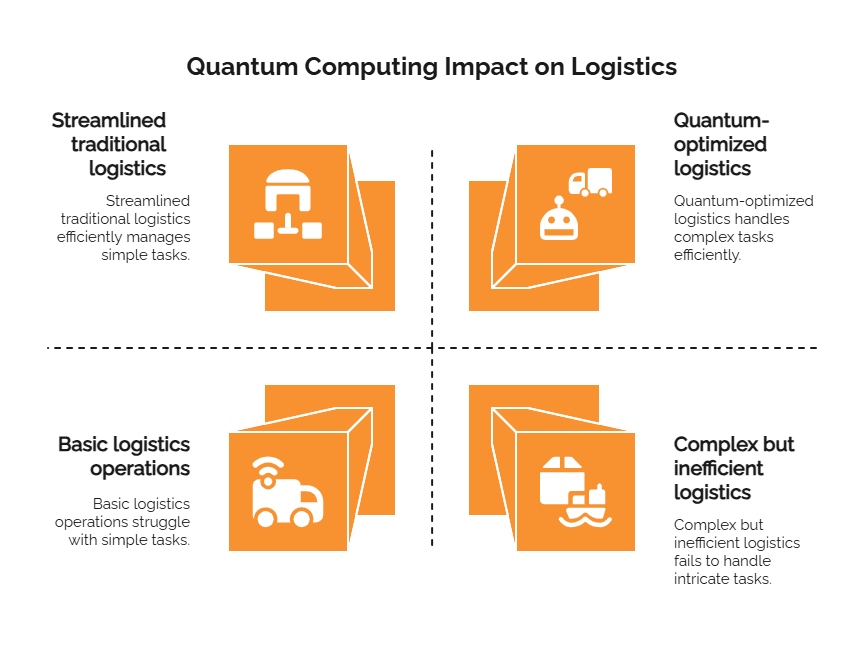Supply chains in 2025 are about much more than movement of goods from point A to point B. They are connected and “smart” ecosystems built on real-time data and increasingly sophisticated algorithms. Now they’re being advanced even further by what initially may have seemed futuristic and unapproachable technology: quantum computing. This isn’t a glimpse into the future: This is happening now! In the logistics space, where complexity and timing matter, quantum computing is opening doors we couldn’t imagine.
Introduction: Why 2025 Is a Turning Point for Supply Chains
The current state of supply chains is facing more pressure than ever. The combination of global connections, rising consumer expectations, and unanticipated disruptions—like climate events—has made logistics a very complicated problem. We’ve moved beyond just speed; companies are demanding intelligent, flexible systems. And that takes us to 2025, where quantum computing will no longer only be in labs, research papers and theoretical papers, but the way we create logistics plans.
What is exciting is that we are not solving problems with more trucks and warehouses, but with new, powerful thinking and computing. Quantum computing offers a different type of intelligence to solve these problems, with the ability to help make better decisions even faster.
What Is Quantum Computing? (And Why Should Supply Chain Leaders Care?)
Quantum computing doesn’t follow the rules of regular computers. Instead of using binary bits (just 0s and 1s), quantum computers use qubits. Qubits can be both 0 and 1 at the same time, thanks to something called superposition. This means quantum machines can perform many calculations all at once.
Then there’s entanglement—a strange but powerful feature where two qubits become linked. Change one, and the other changes too, instantly. This gives quantum computers the ability to handle a huge number of variables in parallel.
Why should logistics leaders care? Because problems like planning delivery routes, forecasting demand, and managing stock across countries involve massive datasets and variables. Quantum computing can work through these fast, helping teams make decisions that are more accurate and made in less time.

Current Challenges in Logistics Optimization That Quantum Aims to Solve
Let’s delve into the pain points that today’s supply chains grapple with and how quantum computing is poised to address them:
Complexity of Route Optimization:
Delivery networks are messy. Especially with last-mile delivery, there are tons of route combinations. Standard software takes shortcuts—it gets close to the best route, but not always spot-on. Quantum computing can explore all possibilities at once and land on the actual best one.
Real-Time Supply Chain Visibility:
There’s so much data—orders, delays, inventory changes, weather updates. Traditional systems often get overwhelmed or lag behind. Quantum machines can process all of this in parallel, helping companies respond faster and with more clarity.
Inventory Balancing and Demand Forecasting:
Figuring out how much stock to keep where isn’t easy. Demand varies, delays happen, and storage costs money. Quantum-enhanced models handle the unknowns better and give more reliable forecasts so businesses can avoid overstocking or stockouts.
Multi-Tier Supplier Risk Modeling:
It’s not just your suppliers—it’s your suppliers’ suppliers. Disruptions ripple through the system. Classical tools often miss these connections. Quantum computing helps map out these networks and simulate what might go wrong, so companies can plan for it.
Network Design and Optimization:
Deciding where to position warehouses, which shipping routes to use, and how to service specific areas is a complex puzzle with thousands of pieces. Quantum algorithms simplify the process of trialing different layouts to arrive at the most efficient architecture.
Deep Dive: How Quantum Algorithms Improve Logistics Use Cases
Let’s take a deeper look into how quantum solutions are applied to logistics:
Route Optimization:
When it comes to managing the “traveling salesman” problem, quantum systems are doing it on steroids. Quantum models will identify the fastest, most fuel-efficient delivery with multiple stops and will do it faster and more accurate than conventional models.
Forecasting and Scenario Planning:
Quantum models do not simply look at what has happened, they look at what could happen. Quantum models can simulate several futures simultaneously, thereby helping companies prepare for different scenarios – particularly when facing an entry into a new market, or uncertainty in an always-changing market.
Dynamic Resource Distribution:
Determining which warehouse to fulfill, or how to reroute for weather or staffing, can be modeled in real-time. Quantum tech can process these time-varying factors quickly and provide the best recommendation.
Risk and Disruption Modeling:
What happens if a key port closes? Or if a supplier goes offline? Quantum simulations can play out these what-if situations in detail, so logistics teams can act before problems snowball.
Real-World Applications: Quantum in Action (2025)
Quantum computing isn’t just theoretical anymore. Here’s how some leading players are exploring its potential:
DHL & IBM:
They joined forces to use quantum systems for smarter route planning. These systems can factor in customs, delays, weather, and even fuel pricing—all in one model—to suggest the best delivery plan.
Volkswagen:
They’ve used quantum to manage traffic in cities, and are now applying that to logistics. The goal? Optimize fleet movement and reduce delivery slowdowns in crowded areas.
Cold Chain Logistics Startups:
These companies manage products that need specific temperatures. Quantum systems help plan routes that keep items like medicine or fresh produce at the right temperature, reducing waste and ensuring quality.
Each of these examples shows the incremental but steady entrance of quantum capabilities into mainstream supply chain thinking. They are proof that quantum isn’t decades away—it’s arriving now, one use case at a time.
Overcoming Barriers: What’s Still Holding Quantum Back?
Despite its promise, quantum computing is not a plug-and-play solution yet. Key challenges include:
Hardware Maturity:
Quantum computers are still finicky. They need very cold environments to work and are expensive to build. Scaling them for everyday logistics use isn’t quite there yet.
Talent Shortage:
Quantum computing combines physics, math, and advanced coding. Finding people with all three skills isn’t easy. Most supply chain teams don’t have this expertise yet.
Integration Complexity:
Existing ERP and logistics systems weren’t designed with quantum in mind. It’ll take new APIs, custom software, and system upgrades to make everything work together.
Business Case Uncertainty:
It’s early days. The ROI on quantum projects is still fuzzy, and many efforts are pilot programs. It takes executive vision and patience to invest in something that’s still emerging.
What Businesses Can Do Now to Get Quantum-Ready
Even though we are early in the adoption curve, businesses can take steps to prepare for the quantum era:
Experiment with Quantum-Inspired Algorithms:
These mimic some quantum behaviors but run on classical machines. They’re a great starting point and can still boost performance.
Form Partnerships:
Working with universities, startups, or large tech companies involved with quantum allows companies to learn, test, and grow with the specialists.
Train Strategically:
Start training your teams, particularly the planners, IT, and data analysts on quantum. Training for knowledge creates a more flexible workforce, even basic quantum knowledge.
Modernize ERP Systems:
If you make your systems as flexible and modular as possible today, you’ll be able to roll out quantum-driven tools even more easily later. APIs, cloud-enabled, and open architectures are what you want.
These efforts lay the foundation for quicker adoption when quantum solutions mature—and may yield unexpected advantages even in the short term.
2025 and Beyond: The Future of Quantum Supply Chains
Soon, companies won’t need to own quantum hardware. They’ll tap into Quantum-as-a-Service through the cloud, running simulations or route optimizations just like any other API call.
ERP platforms will even start to adopt quantum capabilities behind the scenes, perhaps along the lines of improved forecasting capabilities or disruption alerts, in which the user need not even realize they are using quantum technology.
This transition will help companies shift from responding to issues to being forward-looking and preventing them. Insights powered by quantum will notify teams earlier and direct them in their forward-looking decisions.
Final Thoughts: Strategic Takeaways for Supply Chain Leaders
Quantum computing is not some future development anymore—it’s real, and beginning to develop real use cases in 2025. Although we will only see its full impact over time, what’s clear at the intersection of supply chains and quantum, is that this technology will change the nature of supply chains.
What is a supply chain leader supposed to do? Start small, stay curious and prepare. Whether early experimentation, training or upgrading current systems, the things you do now will help you prepare for the future.
Quantum is not going to eliminate complexity. But it will provide us tools to deal with it more accurately. That could be a significant override in a chaotic world.
Take the First Step Towards Transformation
Effectively manage your financials, multiple channel inventory, and production workflows with our award-winning ERP.
Let Versa Cloud ERP do the heavy lifting for you.
Do Business on the Move!
Make your businesses hassle-free and cut the heavyweights sign up for the Versa Cloud ERP today!!
Join our Versa Community and be Future-ready with us.








